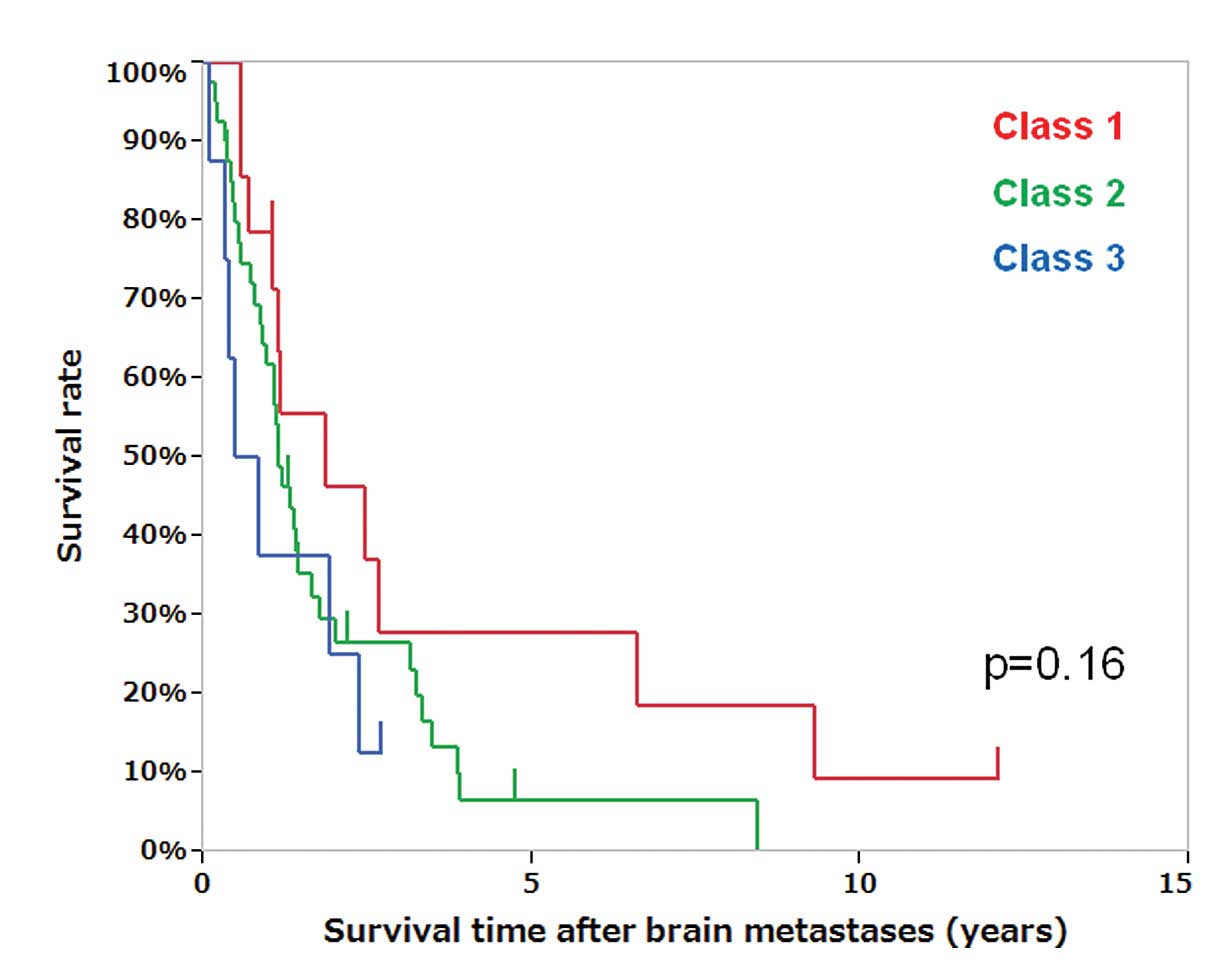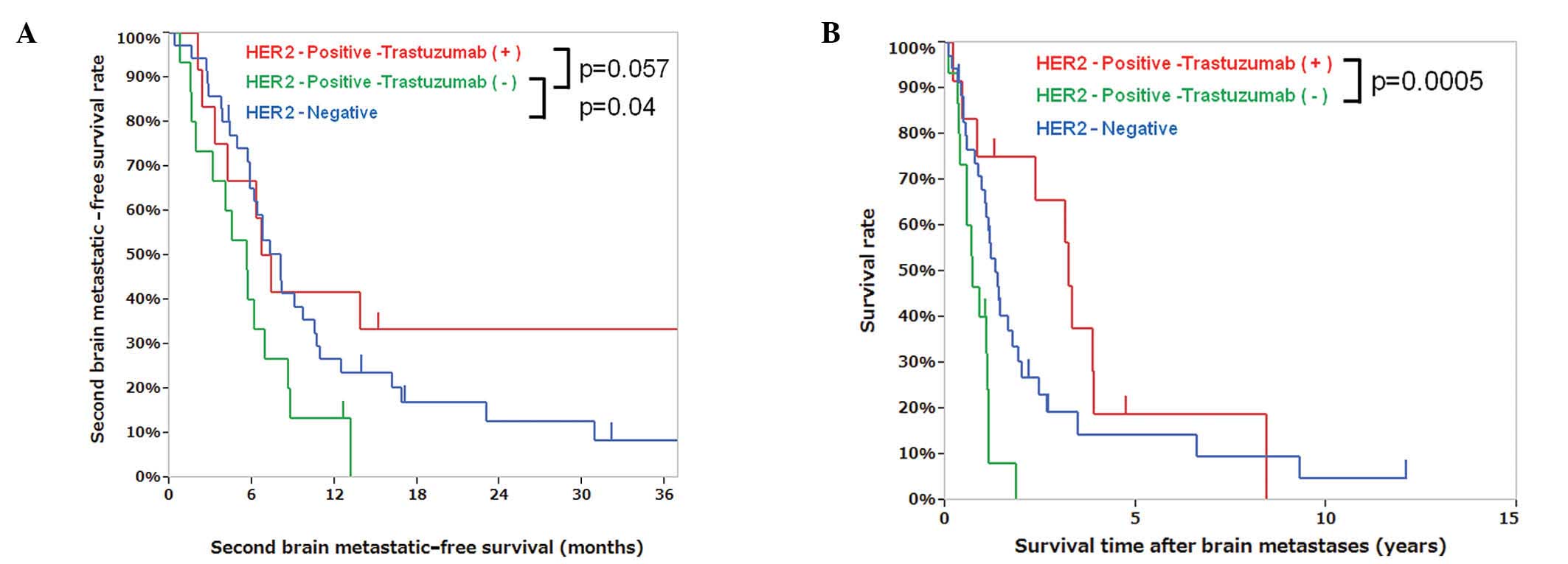|
1.
|
Bogina G, Bortesi L, Marconi M, Venturini
M, Lunardi G, Coati F, Massocco A, Manfrin E, Pegoraro C and
Zamboni G: Comparison of hormonal receptor and HER-2 status between
breast primary tumours and relapsing tumours: clinical implications
of progesterone receptor loss. Virchows Arch. 459:1–10. 2011.
View Article : Google Scholar
|
|
2.
|
Broom RJ, Tang PA, Simmons C, Bordeleau L,
Mulligan AM, O’Malley FP, Miller N, Andrulis IL, Brenner DM and
Clemons MJ: Changes in estrogen receptor, progesterone receptor and
Her-2/neu status with time: discordance rates between primary and
metastatic breast cancer. Anticancer Res. 29:1557–1562. 2009.
|
|
3.
|
Guarneri V, Giovannelli S, Ficarra G,
Bettelli S, Maiorana A, Piacentini F, Barbieri E, Dieci MV, D’Amico
R, Jovic G and Conte P: Comparison of HER-2 and hormone receptor
expression in primary breast cancers and asynchronous paired
metastases: impact on patient management. Oncologist. 13:838–844.
2008. View Article : Google Scholar
|
|
4.
|
Nishimura R, Osako T, Okumura Y, Tashima
R, Toyozumi Y and Arima N: Changes in the ER, PgR, HER2, p53 and
Ki-67 biological markers between primary and recurrent breast
cancer: discordance rates and prognosis. World J Surg Oncol.
9:1312011. View Article : Google Scholar : PubMed/NCBI
|
|
5.
|
Yonemori K, Tsuta K, Shimizu C, Hatanaka
Y, Hashizume K, Ono M, Nakanishi Y, Hasegawa T, Miyakita Y, Narita
Y, Shibui S and Fujiwara Y: Immunohistochemical profiles of brain
metastases from breast cancer. J Neurooncol. 90:223–228. 2008.
View Article : Google Scholar : PubMed/NCBI
|
|
6.
|
Johnston SR, Saccani-Jotti G, Smith IE,
Salter J, Newby J, Coppen M, Ebbs SR and Dowsett M: Changes in
estrogen receptor, progesterone receptor, and pS2 expression in
tamoxifen-resistant human breast cancer. Cancer Res. 55:3331–3338.
1995.PubMed/NCBI
|
|
7.
|
Edgerton SM, Moore D II, Merkel D and Thor
AD: erbB-2 (HER-2) and breast cancer progression. Appl
Immunohistochem Mol Morphol. 11:214–221. 2003. View Article : Google Scholar : PubMed/NCBI
|
|
8.
|
Kerbel RS: Growth dominance of the
metastatic cancer cell: cellular and molecular aspects. Adv Cancer
Res. 55:87–132. 1990. View Article : Google Scholar : PubMed/NCBI
|
|
9.
|
Pertschuk LP, Axiotis CA, Feldman JG, Kim
YD, Karavattayhayyil SJ and Braithwaite L: Marked intratumoral
heterogeneity of the proto-oncogene Her-2/neu determined by three
different detection systems. Breast J. 5:369–374. 1999. View Article : Google Scholar
|
|
10.
|
Gancberg D, Di Leo A, Cardoso F, Rouas G,
Pedrocchi M, Paesmans M, Verhest A, Bernard-Marty C, Piccart MJ and
Larsimont D: Comparison of HER-2 status between primary breast
cancer and corresponding distant metastatic sites. Ann Oncol.
13:1036–1043. 2002. View Article : Google Scholar : PubMed/NCBI
|
|
11.
|
Sari E, Guler G, Hayran M, Gullu I,
Altundag K and Ozisik Y: Comparative study of the
immunohistochemical detection of hormone receptor status and HER-2
expression in primary and paired recurrent/metastatic lesions of
patients with breast cancer. Med Oncol. 28:57–63. 2011. View Article : Google Scholar
|
|
12.
|
Baselga J, Tripathy D, Mendelsohn J, et
al: Phase II study of weekly intravenous recombinant humanized
anti-p185HER2 monoclonal antibody in patients with
HER2/neu-overexpressing metastatic breast cancer. J Clin Oncol.
14:737–744. 1996.
|
|
13.
|
Harvey JM, Clark GM, Osborne CK and Allred
DC: Estrogen receptor status by immunohistochemistry is superior to
the ligand-binding assay for predicting response to adjuvant
endocrine therapy in breast cancer. J Clin Oncol. 17:1474–1481.
1999.
|
|
14.
|
Perren A, Weng LP, Boag AH, Ziebold U,
Thakore K, Dahia PL, Komminoth P, Lees JA, Mulligan LM, Mutter GL
and Eng C: Immunohistochemical evidence of loss of PTEN expression
in primary ductal adenocarcinomas of the breast. Am J Pathol.
155:1253–1260. 1999. View Article : Google Scholar : PubMed/NCBI
|
|
15.
|
Gaspar L, Scott C, Rotman M, Asbell S,
Phillips T, Wasserman T, McKenna WG and Byhardt R: Recursive
partitioning analysis (RPA) of prognostic factors in three
Radiation Therapy Oncology Group (RTOG) brain metastases trials.
Int J Radiat Oncol Biol Phys. 37:745–751. 1997. View Article : Google Scholar
|
|
16.
|
Flowers A and Levin VA: Management of
brain metastases from breast carcinoma. Oncology (Williston Park).
7:21–26; discussion 31–34, 1993.
|
|
17.
|
Bendell JC, Domchek SM, Burstein HJ,
Harris L, Younger J, Kuter I, Bunnell C, Rue M, Gelman R and Winer
E: Central nervous system metastases in women who receive
trastuzumab-based therapy for metastatic breast carcinoma. Cancer.
97:2972–2977. 2003. View Article : Google Scholar
|
|
18.
|
Kirsch DG, Ledezma CJ, Mathews CS, Bhan
AK, Ancukiewicz M, Hochberg FH and Loeffler JS: Survival after
brain metastases from breast cancer in the trastuzumab era. J Clin
Oncol. 23:2114–2117. 2005. View Article : Google Scholar : PubMed/NCBI
|
|
19.
|
Le Scodan R, Jouanneau L, Massard C,
Gutierrez M, Kirova Y, Cherel P, Gachet J, Labib A and
Mouret-Fourme E: Brain metastases from breast cancer: prognostic
significance of HER-2 overexpression, effect of trastuzumab and
cause of death. BMC Cancer. 11:3952011.PubMed/NCBI
|
|
20.
|
Nam BH, Kim SY, Han HS, Kwon Y, Lee KS,
Kim TH and Ro J: Breast cancer subtypes and survival in patients
with brain metastases. Breast Cancer Res. 10:R202008. View Article : Google Scholar : PubMed/NCBI
|
|
21.
|
Park IH, Ro J, Lee KS, Nam BH, Kwon Y and
Shin KH: Trastuzumab treatment beyond brain progression in
HER2-positive metastatic breast cancer. Ann Oncol. 20:56–62. 2009.
View Article : Google Scholar : PubMed/NCBI
|
|
22.
|
Duchnowska R, Dziadziuszko R,
Czartoryska-Arlukowicz B, Radecka B, Szostakiewicz B,
Sosinska-Mielcarek K, Karpinska A, Staroslawska E, Kubiatowski T
and Szczylik C: Risk factors for brain relapse in HER2-positive
metastatic breast cancer patients. Breast Cancer Res Treat.
117:297–303. 2009. View Article : Google Scholar : PubMed/NCBI
|
|
23.
|
Romond EH, Perez EA, Bryant J, et al:
Trastuzumab plus adjuvant chemotherapy for operable HER2-positive
breast cancer. N Engl J Med. 353:1673–1684. 2005. View Article : Google Scholar : PubMed/NCBI
|
|
24.
|
Smith I, Procter M, Gelber RD, et al: HERA
study team: 2-year follow-up of trastuzumab after adjuvant
chemotherapy in HER2-positive breast cancer: a randomised
controlled trial. Lancet. 369:29–36. 2007.
|
|
25.
|
van Vulpen M, Kal HB, Taphoorn MJ and
El-Sharouni SY: Changes in blood-brain barrier permeability induced
by radiotherapy: Implications for timing of chemotherapy? (Review).
Oncol Rep. 9:683–688. 2002.PubMed/NCBI
|
|
26.
|
Maki DD and Grossman RI: Patterns of
disease spread in meta-static breast carcinoma: influence of
estrogen and progesterone receptor status. AJNR Am J Neuroradiol.
21:1064–1066. 2000.PubMed/NCBI
|
|
27.
|
Samaan NA, Buzdar AU, Aldinger KA, Schultz
PN, Yang KP, Romsdahl MM and Martin R: Estrogen receptor: a
prognostic factor in breast cancer. Cancer. 47:554–560. 1981.
View Article : Google Scholar : PubMed/NCBI
|
|
28.
|
Tham YL, Sexton K, Kramer R, Hilsenbeck S
and Elledge R: Primary breast cancer phenotypes associated with
propensity for central nervous system metastases. Cancer.
107:696–704. 2006. View Article : Google Scholar : PubMed/NCBI
|
|
29.
|
Leyland-Jones B: Human epidermal growth
factor receptor 2-positive breast cancer and central nervous system
metastases. J Clin Oncol. 27:5278–5286. 2009. View Article : Google Scholar : PubMed/NCBI
|
|
30.
|
No authors listed. Tamoxifen for early
breast cancer: an overview of the randomised trials. Early Breast
Cancer Trialists’ Collaborative Group. Lancet. 351:1451–1467.
1998.
|
|
31.
|
Schneeweiss A, Marme F, Ruiz A, Manikhas
AG, Bottini A, Wolf M, Sinn HP, Mansouri K, Kennedy L and Bauknecht
T: A randomized phase II trial of doxorubicin plus pemetrexed
followed by docetaxel versus doxorubicin plus cyclophosphamide
followed by docetaxel as neoadjuvant treatment of early breast
cancer. Ann Oncol. 22:609–617. 2011. View Article : Google Scholar
|
|
32.
|
Yonemori K, Tsuta K, Ono M, Shimizu C,
Hirakawa A, Hasegawa T, Hatanaka Y, Narita Y, Shibui S and Fujiwara
Y: Disruption of the blood brain barrier by brain metastases of
triple-negative and basal-type breast cancer but not
HER2/neu-positive breast cancer. Cancer. 116:302–308. 2010.
View Article : Google Scholar : PubMed/NCBI
|
|
33.
|
Konecny G, Pauletti G, Pegram M, et al:
Quantitative association between HER-2/neu and steroid hormone
receptors in hormone receptor-positive primary breast cancer. J
Natl Cancer Inst. 95:142–153. 2003. View Article : Google Scholar
|
|
34.
|
Gong Y, Booser DJ and Sneige N: Comparison
of HER-2 status determined by fluorescence in situ hybridization in
primary and metastatic breast carcinoma. Cancer. 103:1763–1769.
2005. View Article : Google Scholar : PubMed/NCBI
|
|
35.
|
Lower EE, Glass E, Blau R and Harman S:
HER-2/neu expression in primary and metastatic breast cancer.
Breast Cancer Res Treat. 113:301–306. 2009. View Article : Google Scholar : PubMed/NCBI
|
|
36.
|
Niehans GA, Singleton TP, Dykoski D and
Kiang DT: Stability of HER-2/neu expression over time and at
multiple metastatic sites. J Natl Cancer Inst. 85:1230–1235. 1993.
View Article : Google Scholar : PubMed/NCBI
|
|
37.
|
Pectasides D, Gaglia A, Arapantoni-Dadioti
P, Bobota A, Valavanis C, Kostopoulou V, Mylonakis N, Karabelis A,
Pectasides M and Economopoulos T: HER-2/neu status of primary
breast cancer and corresponding metastatic sites in patients with
advanced breast cancer treated with trastuzumab-based therapy.
Anticancer Res. 26:647–653. 2006.PubMed/NCBI
|
|
38.
|
Regitnig P, Schippinger W, Lindbauer M,
Samonigg H and Lax SF: Change of HER-2/neu status in a subset of
distant metastases from breast carcinomas. J Pathol. 203:918–926.
2004. View Article : Google Scholar : PubMed/NCBI
|
|
39.
|
Shimizu C, Fukutomi T, Tsuda H,
Akashi-Tanaka S, Watanabe T, Nanasawa T and Sugihara K: c-erbB-2
protein overexpression and p53 immunoreaction in primary and
recurrent breast cancer tissues. J Surg Oncol. 73:17–20. 2000.
View Article : Google Scholar : PubMed/NCBI
|
|
40.
|
Zidan J, Dashkovsky I, Stayerman C, Basher
W, Cozacov C and Hadary A: Comparison of HER-2 overexpression in
primary breast cancer and metastatic sites and its effect on
biological targeting therapy of metastatic disease. Br J Cancer.
93:552–556. 2005. View Article : Google Scholar : PubMed/NCBI
|
|
41.
|
Fuchs IB, Loebbecke M, Buhler H,
Stoltenburg-Didinger G, Heine B, Lichtenegger W and Schaller G:
HER2 in brain metastases: issues of concordance, survival, and
treatment. J Clin Oncol. 20:4130–4133. 2002. View Article : Google Scholar : PubMed/NCBI
|
|
42.
|
Liedtke C, Broglio K, Moulder S, et al:
Prognostic impact of discordance between triple-receptor
measurements in primary and recurrent breast cancer. Ann Oncol.
20:1953–1958. 2009. View Article : Google Scholar : PubMed/NCBI
|
|
43.
|
Geyer CE, Forster J, Lindquist D, et al:
Lapatinib plus capecitabine for HER2-positive advanced breast
cancer. N Engl J Med. 355:2733–2743. 2006. View Article : Google Scholar : PubMed/NCBI
|
















